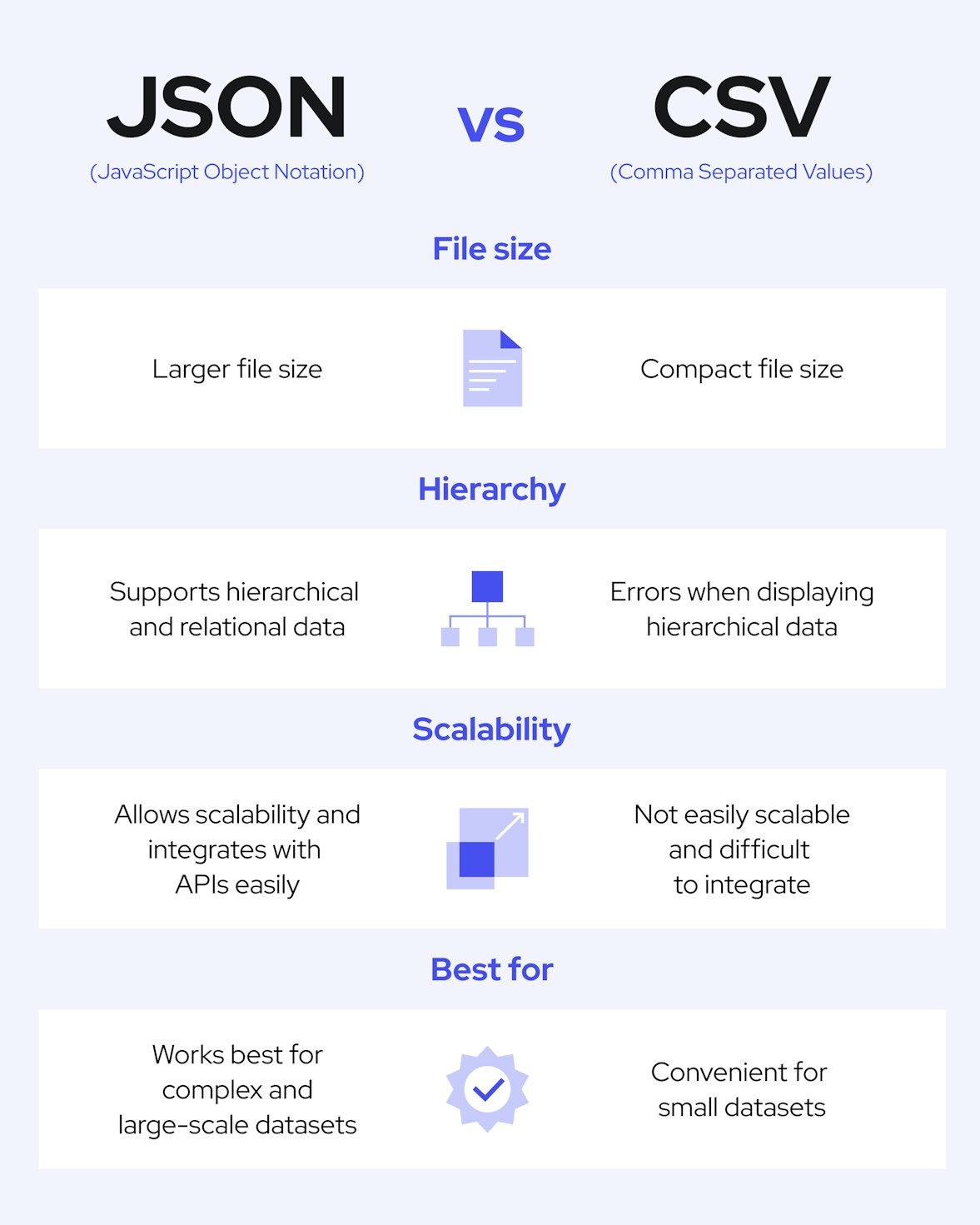Introduction
Greetings, JSON Lovers!
In the realm of data exchange, two formidable formats stand tall: JSON and CSV. Each possesses unique attributes, catering to distinct needs. Determining which format is "better" hinges on understanding their strengths and limitations. In this comprehensive guide, we will delve into the intricacies of JSON and CSV, enabling you to make an informed decision.
Structured vs. Flat Data
JSON: Structured Delight
JSON (JavaScript Object Notation) is a lightweight, text-based data format that excels in representing structured data. Its hierarchical structure, akin to a tree, allows for the organization of data into nested objects and arrays. This makes JSON ideal for representing complex and interconnected data structures.
CSV: Flat and Flexible
Comma-separated values (CSV) is a plain text format that stores data in rows and columns, akin to a spreadsheet. Its simplicity makes CSV easy to understand and process, but it lacks the hierarchical structure of JSON. While CSV can handle simple data structures, it struggles with complex nested relationships.
Performance and Scalability
JSON: Performance Trade-off
JSON’s structured nature introduces overhead when parsing and processing large datasets. However, this overhead is mitigated by the efficiency of modern parsers and the widespread availability of JSON-based libraries.
CSV: Scalability Champ
CSV’s flat structure makes it lightning-fast to parse and process, even for massive datasets. Its simplicity also contributes to its scalability, making it suitable for handling large volumes of data.
Usability and Integration
JSON: User-Friendly Accessibility
JSON’s readability and human-friendliness make it accessible to both developers and non-technical users. Its intuitive structure allows for easy navigation and comprehension.
CSV: Simplicity for Integration
CSV’s straightforward format facilitates seamless integration with various tools and applications. Its simple syntax enables quick parsing and manipulation, making it a popular choice for data exchange between different systems.
Security and Data Integrity
JSON: Potential Vulnerabilities
JSON’s open nature may introduce security vulnerabilities, as malicious scripts can be embedded within the data. Proper sanitization and validation techniques are crucial to ensure data integrity.
CSV: Inherent Data Integrity
CSV’s fixed structure and lack of support for complex data types enhance data integrity. The absence of embedded scripts minimizes the risk of security breaches.

Source coresignal.com
Comparative Table: JSON vs. CSV
| Feature | JSON | CSV |
|---|---|---|
| Data Structure | Hierarchical | Flat |
| Performance | Overhead for large datasets | Scalable for large datasets |
| Usability | User-friendly and accessible | Simple and easy to integrate |
| Security | Potential vulnerabilities | High data integrity |
| Applications | Complex data representations | Simple data exchange |
| Examples | RESTful APIs, document databases | Spreadsheets, data exports |
Conclusion
JSON and CSV are both powerful data exchange formats, each with its own strengths and applications. JSON excels in representing structured data, while CSV shines in handling flat data and scalability. When choosing between the two, consider the nature of your data, performance requirements, and usability preferences.
Check out our other insightful articles:
FAQ about JSON vs CSV: Which is Better?
1. What is JSON?
JSON (JavaScript Object Notation) is a text-based data format used to represent structured data. It is often used for data exchange between web applications.
2. What is CSV?
CSV (Comma-Separated Values) is a plain-text data format that uses commas to separate values. It is widely used for importing and exporting data between different applications.
3. Which one is easier to read: JSON or CSV?
JSON is easier to read than CSV because it uses a hierarchical structure and key-value pairs, making it more organized and user-friendly.
4. Which one is more efficient: JSON or CSV?
JSON is more efficient than CSV when transferring data in bulk over a network because it is more compact and requires less bandwidth.
5. Which one is more secure: JSON or CSV?
Neither JSON nor CSV provides strong security features. However, JSON can be used with encryption or authentication mechanisms for added security.
6. Which one is better for data storage: JSON or CSV?
JSON is more suitable for data storage in NoSQL databases because it is schema-less and can handle complex data structures. CSV is better for storing tabular data in relational databases.
7. Which one is better for data analysis: JSON or CSV?
JSON is better for data analysis because it provides a structured data format that can be easily parsed by data analysis tools. CSV is more suitable for simple data analysis tasks or for exporting data to spreadsheets.
8. Which one is more widely used: JSON or CSV?
JSON is more widely used in web applications, APIs, and NoSQL databases. CSV is more commonly used in data processing, spreadsheet applications, and importing/exporting data.
9. Can I convert JSON to CSV?
Yes, you can convert JSON to CSV using data conversion tools or scripting languages.
10. Can I convert CSV to JSON?
Yes, you can convert CSV to JSON using data conversion tools or scripting languages.
